HTTP/3: A QUIC Update
Software Development Engineer
Trivikram Kamat

@trivikram
@trivikr

#NodeJSInteractive
#http3
#quic


Tree
Weak
Rum
+
+
Tri
vik
ram
.
.
What's my name again?

My history with Node.js
-
Have been using Node.js for 4 years
-
Started contributing to Node.js core in Oct 2017
-
helped make HTTP/2 stable
-
-
Became Node.js core collaborator in March 2018
-
Organized and mentored four Code+Learn events
What are we going to cover?
-
What's HTTP/1.1, and why HTTP/2 was required
-
What's HTTP/2, and why HTTP/3 was required
-
What's HTTP/3, and
-
We'll see some sample code!
when is it coming?

James Snell
is a Node.js TSC member, who is heading the work on implementing QUIC


Big Thanks to sponsors:

Tatsuhiro Tsujikawa
A big thank you to tatsuhiro-san for his amazing work on ngtcp2
@tatsuhiro-t
HTTP/0.9
Published: 1991
The one line protocol
GET /mypage.html<HTML>
A very simple HTML page
</HTML>HTTP/1.0
Published: May 1996
Building extensibility
GET /mypage.html HTTP/1.0
User-Agent: NCSA_Mosaic/2.0 (Windows 3.1)200 OK
Date: Tue, 15 Nov 1994 08:12:31 GMT
Server: CERN/3.0 libwww/2.17
Content-Type: text/html
<HTML>
A page with an image
<IMG src="/myimage.gif">
</HTML>Versioning information
Browser information
Status code
Headers
<resource>
HTTP/1.1
Published: June 1999
The standardized protocol
GET /en-US/docs/Glossary/Simple_header HTTP/1.1
Host: developer.mozilla.org
User-Agent: Mozilla/5.0 (Macintosh; Intel Mac OS X 10.9; rv:50.0) Gecko/20100101 Firefox/50.0
Accept: text/html,application/xhtml+xml,application/xml;q=0.9,
Accept-Language: en-US,en;q=0.5
Accept-Encoding: gzip, deflate, br
Referer: https://developer.mozilla.org/en-US/docs/Glossary/Simple_headerHTTP/1.1 improvements
-
Persistent connection: using a single TCP connection to send and receive multiple HTTP requests/responses (serial requests)
-
Pipelining: send a second request before the answer for the first one is fully transmitted, lowering the latency for the communication
-
Chunked transfer encoding: streaming data transfer where stream is divided into a series of non-overlapping "chunks"
-
Additional Cache Control mechanisms
-
Content negotiation
Issue #1: Three roundtrips per request


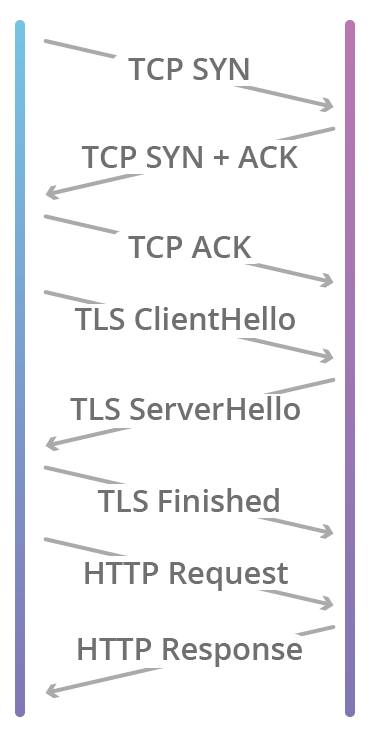

Issue #2: Multiple TCP+TLS connections are created for concurrent requests
http/1.1 server
const https = require("https");
const fs = require("fs");
const options = {
key: fs.readFileSync("ssl/localhost.key"),
cert: fs.readFileSync("ssl/localhost.cert")
};
https
.createServer(options, (req, res) => {
if (req.url === "/") {
fs.createReadStream("./files/index.html").pipe(res);
} else if (req.url === "/style.css") {
fs.createReadStream("./files/style.css").pipe(res);
} else if (req.url === "/script.js") {
fs.createReadStream("./files/script.js").pipe(res);
} else if (req.url === "/globe.png") {
fs.createReadStream("./files/globe.png").pipe(res);
}
})
.listen(3000);http/1.1 server
const https = require("https");
const fs = require("fs");
const options = {
key: fs.readFileSync("ssl/localhost.key"),
cert: fs.readFileSync("ssl/localhost.cert")
};
https
.createServer(options, (req, res) => {
if (req.url === "/") {
fs.createReadStream(`./files/index.html`).pipe(res);
} else {
// regular expression for filename requested
const re = /\/(\w+)*/;
const filename = req.url.replace(re, "$1");
fs.createReadStream(`./files/${filename}`).pipe(res);
}
})
.listen(3000);index.html
<html>
<head>
<link rel="stylesheet" type="text/css"
href="./style.css" />
</head>
<body>
<img id="image" src="./globe.png" />
<div>
<div>Hello</div>
<div id="name">World</div>
</div>
<script type="text/javascript"
src="./script.js"></script>
</body>
</html>
style.css
body {
display: flex;
align-items: center;
}
div {
font-size: 100px;
}script.js
setTimeout(() => {
document.getElementById("name")
.innerHTML = "#NodeJSInteractive!";
document.getElementById("image")
.src = "./njsi.png";
}, 1000);
globe.png

Load the webpage
examine TCP connections with netstat
Issues with HTTP/1.1
-
Three round-trips per request
-
Multiple TCP+TLS connections for concurrent requests
HTTP/2

Published: May 2015
http/2 server
const http2 = require("http2");
const fs = require("fs");
const options = {
key: fs.readFileSync("ssl/localhost.key"),
cert: fs.readFileSync("ssl/localhost.cert")
};
const server = http2.createSecureServer(options).listen(3000);
server.on("stream", (stream, headers) => {
if (headers[":path"] === "/") {
stream.respondWithFile("./files/index.html");
} else {
// regular expression for filename requested
const re = /\/(\w+)*/;
const filename = headers[":path"].replace(re, "$1");
stream.respondWithFile(`./files/${filename}`);
}
});
Load the webpage
examine TCP connections with netstat
Benefits of HTTP/2
-
Multiplexing and concurrency: different HTTP requests onto the same TCP connection
-
Stream dependencies: client can indicate to server which dependencies are important
-
HPACK Header compression: reduces the length of header field encodings by exploiting the redundancy
-
Server push: server can send resources which client has not requested yet
Issues with HTTP/2
-
HPACK is stateful: the encoding and decoding tables have to be maintained by an endpoint
-
High resource consumption in the middle tier
-
Not easily routable along the network: works well is Node.js server communicates with other Node.js server, but not if there's NGINX in between
-
TCP head-of-line blocking
TCP head-of-line blocking
When a single TCP packet is lost or corrupted, all subsequent packets are blocked until the lost one can be successfully transmitted.
With HTTP/2, multiple requests and responses are carried over a single TCP connection. So all those requests/responses will be blocked in case of a dropped TCP packet.
With HTTP/1.1, if that happens, you're only blocking one request
This effect is most significant on high-latency (long-distance), and low-reliability (mobile) connections
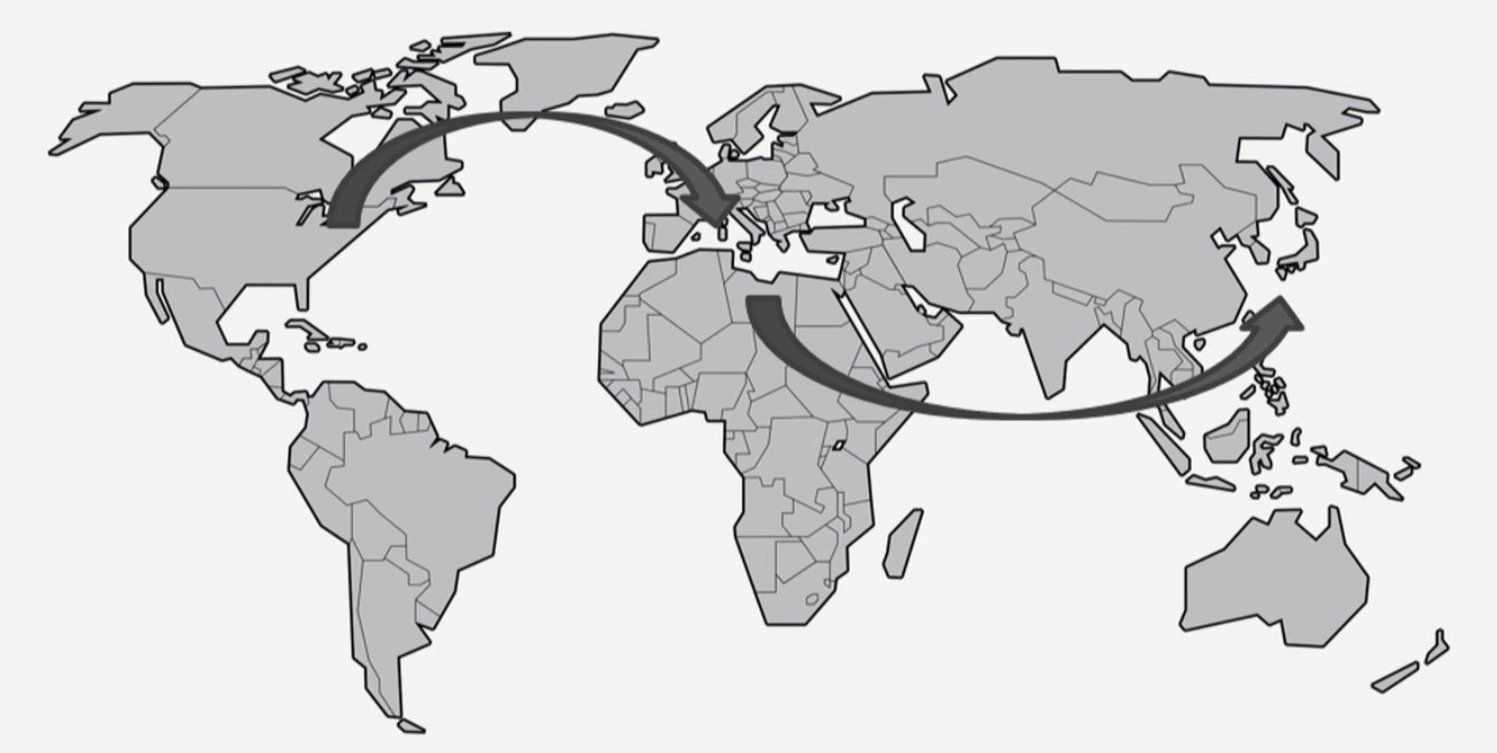

TCP head-of-line blocking
Chain metaphor


TCP connection
CSS packet
JS packet
HTTP/3 over QUIC
draft-24 as of Dec 2019
When setting up multiple streams over QUIC connection, they are treated independently so that if any packet goes missing for one of the streams, only that stream has to pause and wait for the missing packet to get retransmitted.

CSS stream
JS stream
QUIC is built on UDP
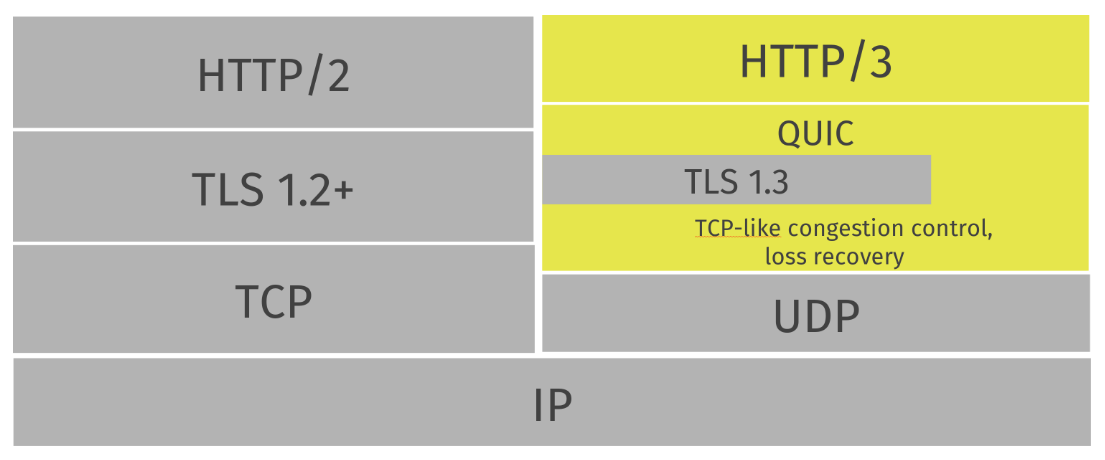
Speaking of UDP...
I could tell you a joke
BUT...
you won't get it 😉
Let me still give it a try...
UDP
packet
bar
walks
into
a
QUIC adds the following to UDP
Error Handling
Acknowledgements
Flow Control
Bidirectional/Unidirectional streams
Packet Sequencing
Built in encryption (TLS 1.3)
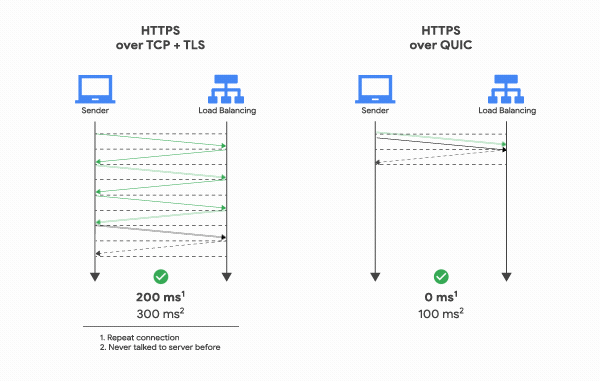
QUIC also reduces roundtrips
Credit: http://bit.ly/36CJ8GZ
Before we write HTTP/3 server
QUIC !== HTTP/3
HTTP/3 is an application protocol that uses QUIC as a transport protocol
HTTP/3
QUIC
UDP
IP
http/3 server
const quic = require("quic");
const fs = require("fs");
const options = {
key: fs.readFileSync("ssl/localhost.key"),
cert: fs.readFileSync("ssl/localhost.cert")
};
const server = quic.createSocket({ port: 3000 });
server.listen(options);
server.on("session", session => {
session.on("stream", (stream, headers) => {
if (headers[":path"] === "/") {
stream.respondWithFile("./files/index.html");
} else {
// regular expression for filename requested
const re = /\/(\w+)*/;
const filename = headers[":path"].replace(re, "$1");
stream.respondWithFile(`./files/${filename}`);
}
});
});
Load the webpage
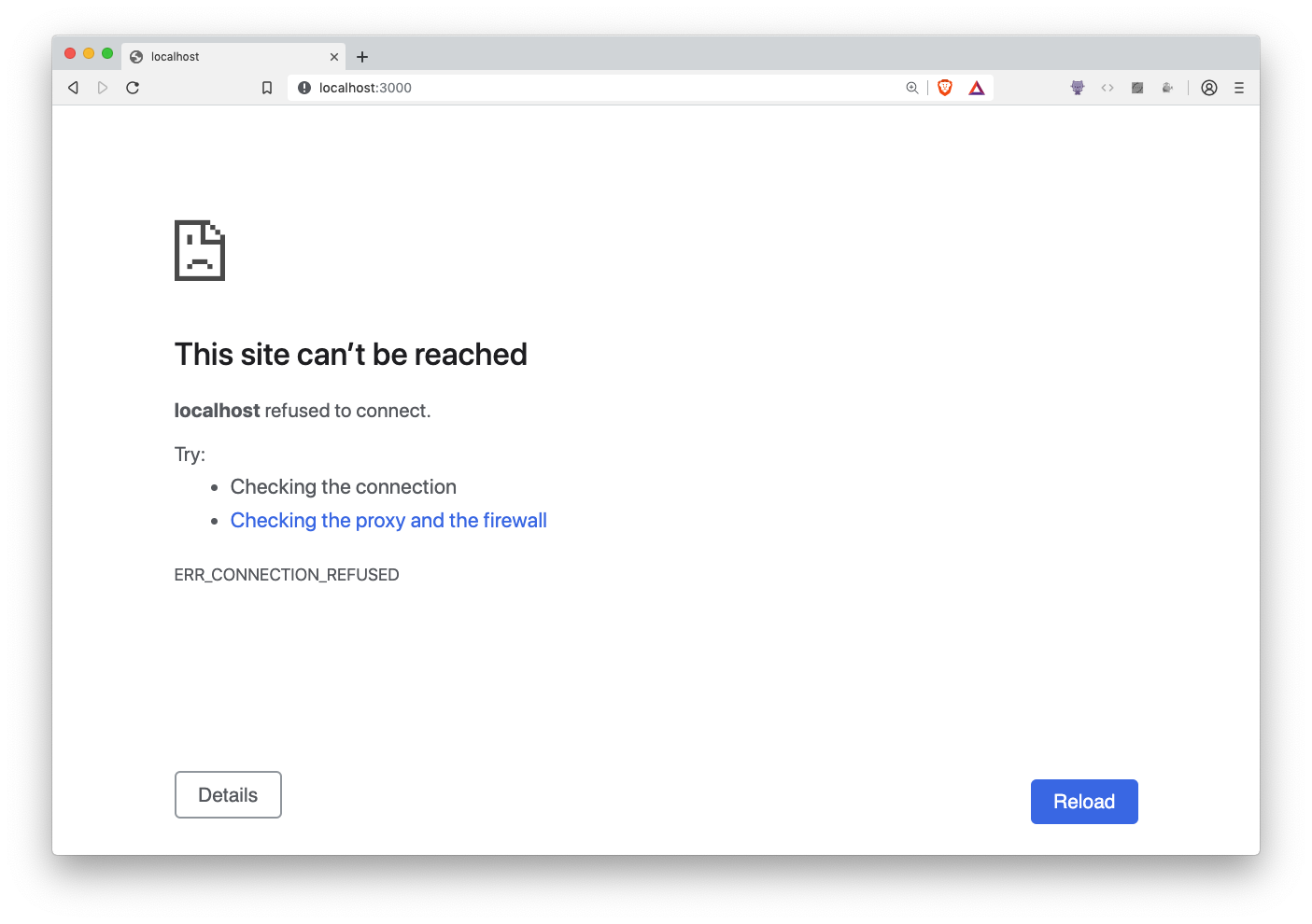
HTTP/3 over QUIC in Node.js is in early stages of development
You can help build it!

nodejs/quic progress
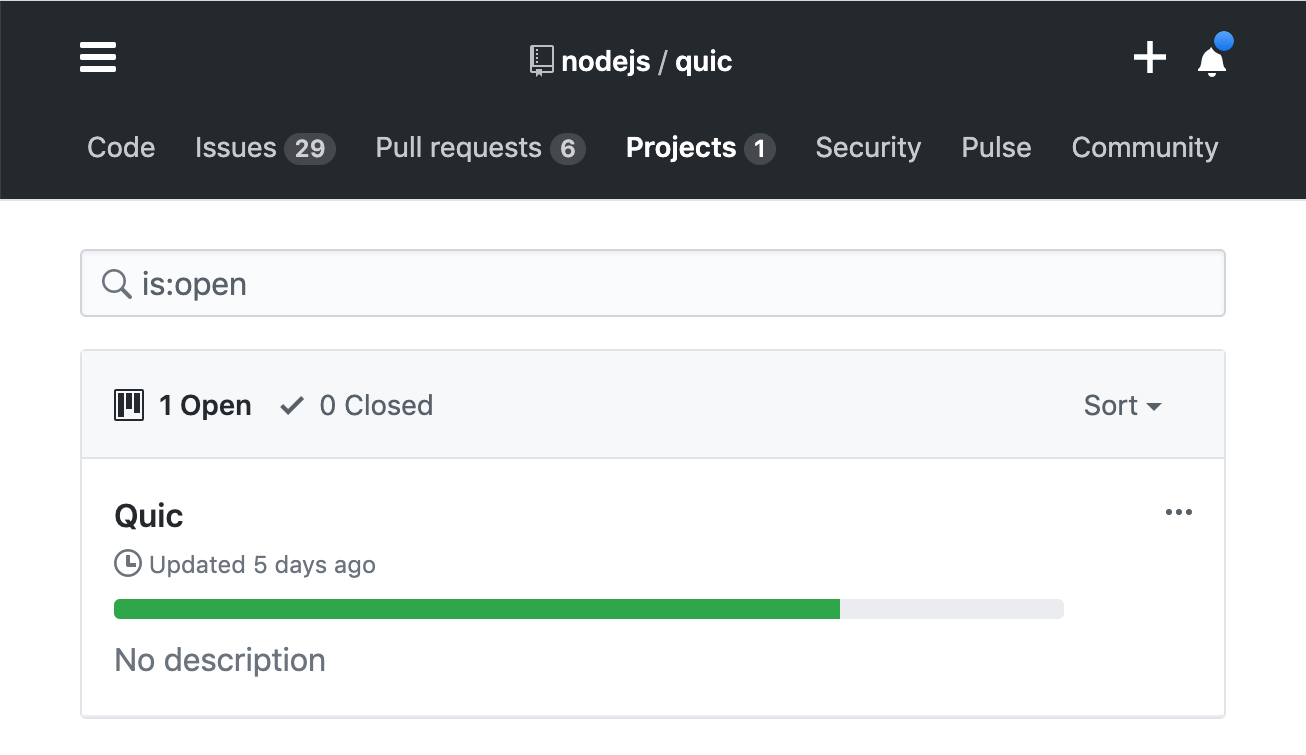
project board
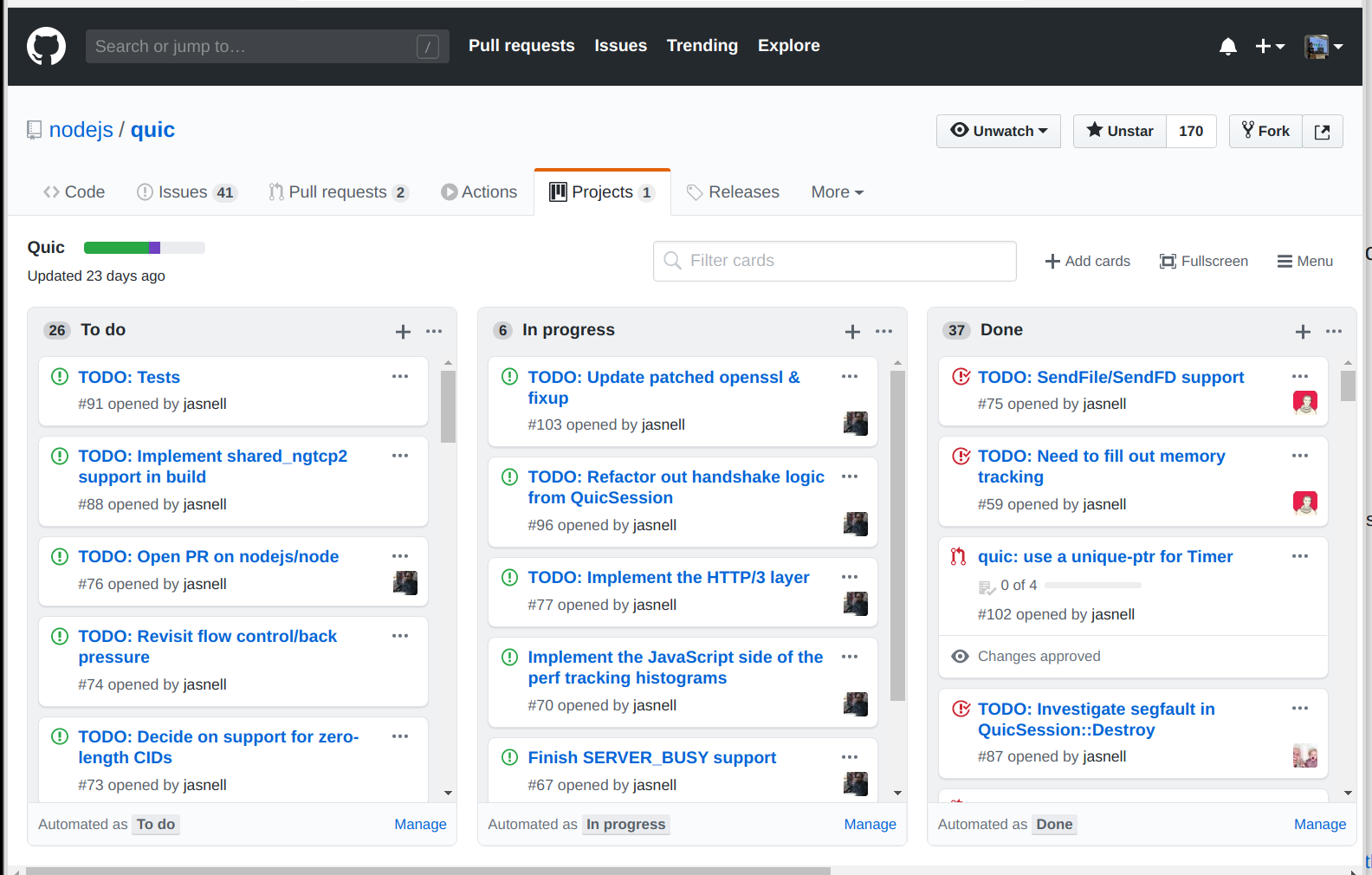
How can I write unit tests?
git clone git@github.com:trivikr/quic.git
cd quic
./configure --experimental-quic --coverage
make -j4 coverage
Current state of JavaScript tests
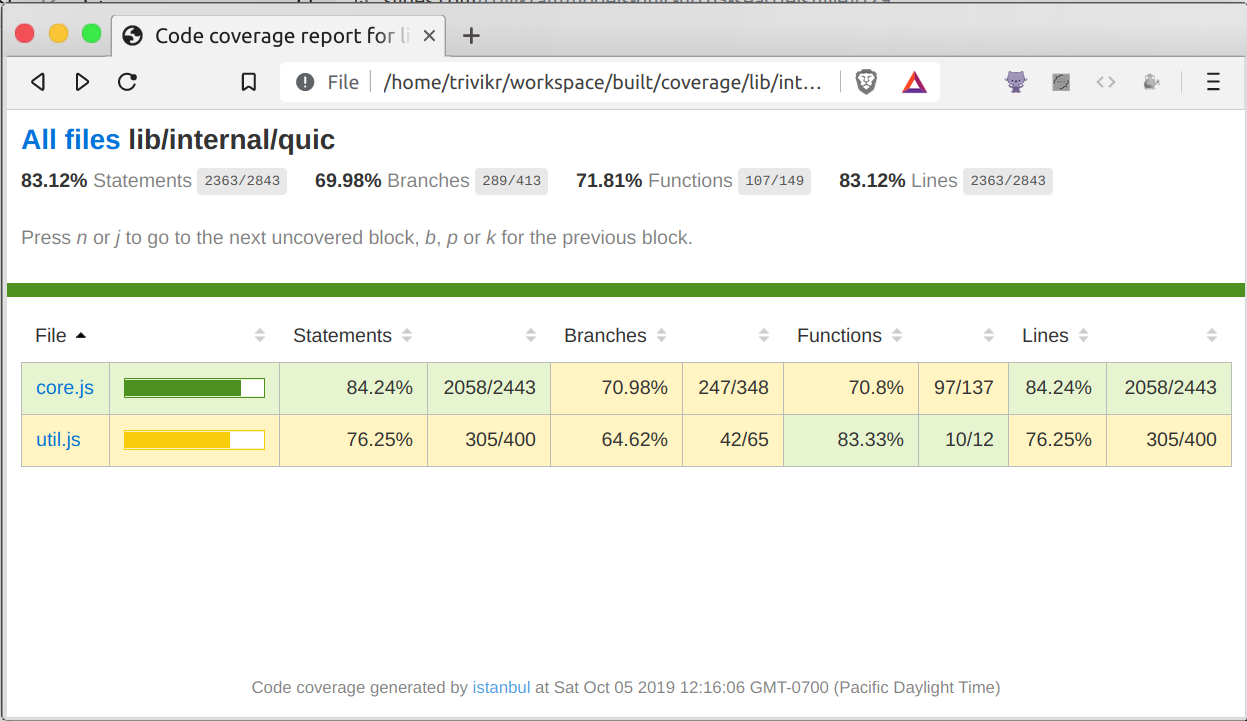
Current state of C++ tests

HTTP/3 IETF draft
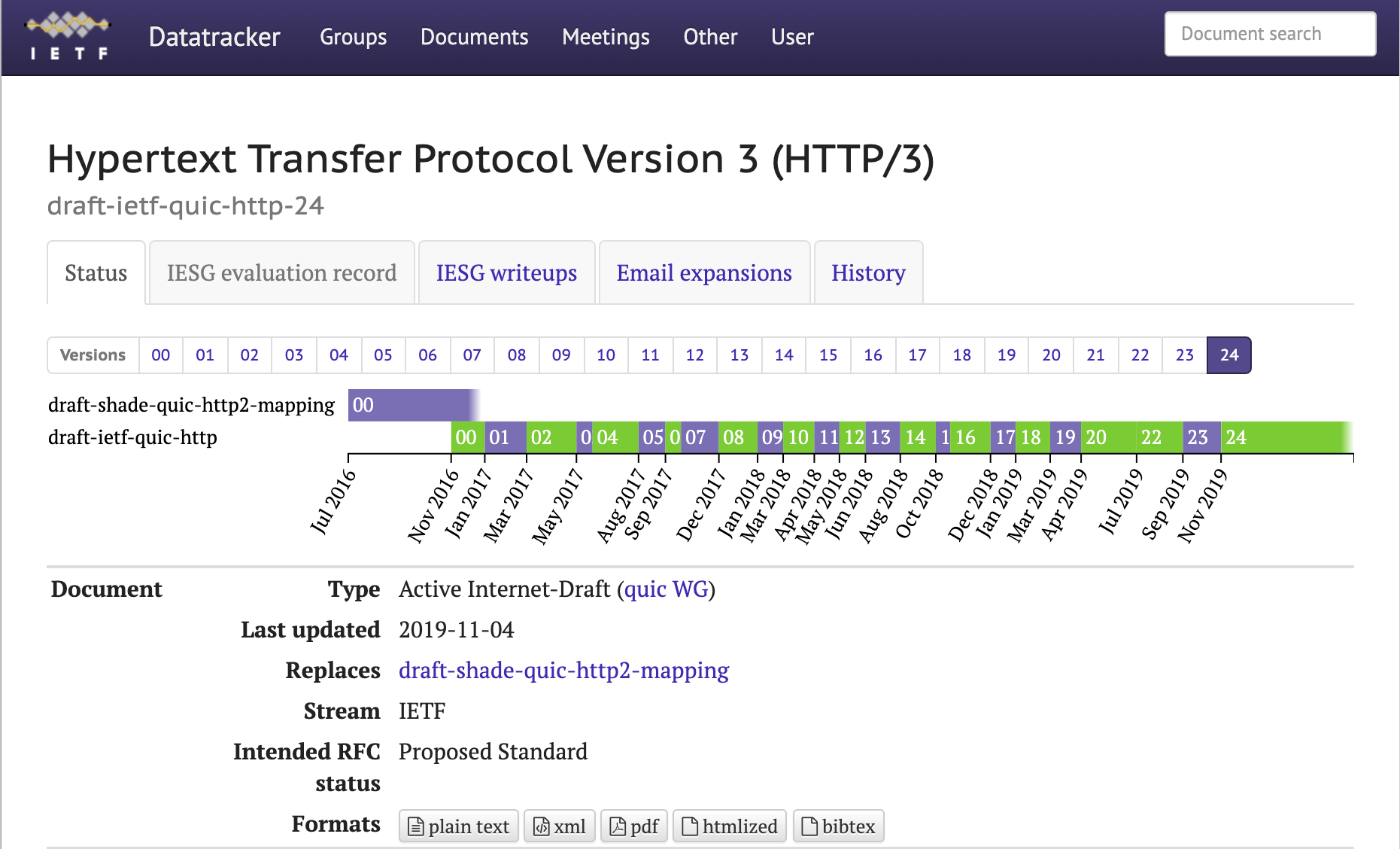
Example webpage on QUIC
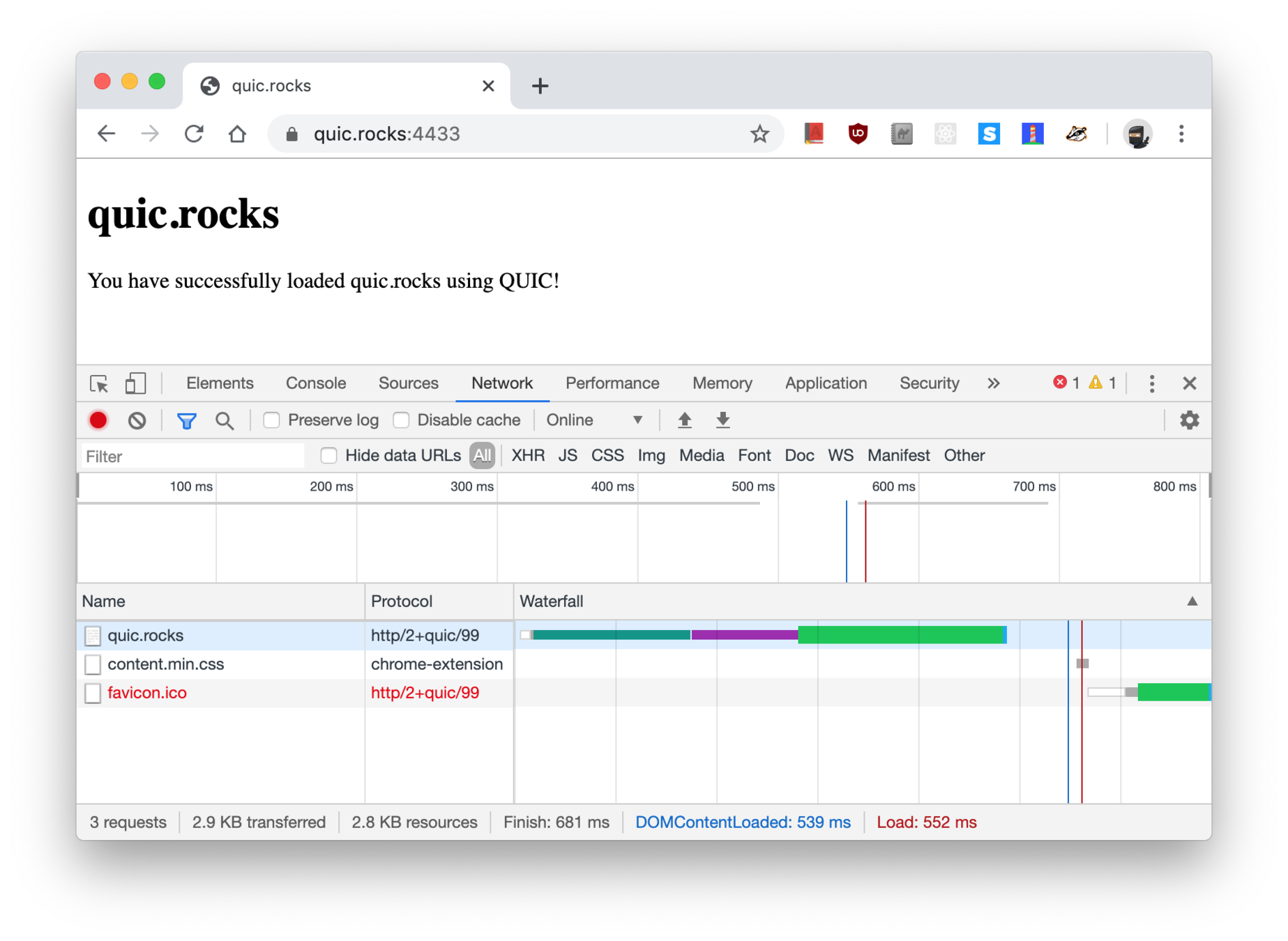
Demo
Summary
-
In HTTP/1.1, multiple TCP+TLS connections were required for concurrent requests
-
HTTP/2 added multiplexing in which multiple HTTP requests were sent onto the same TCP connection
-
TCP head-of-line blocking: the entire TCP connection is brought to halt if a single TCP packet is lost.
-
HTTP/3 over QUIC treats each stream independently, so if any packet goes missing in a stream - only that stream is affected
Thank you for listening!
Trivikram Kamat

@trivikram
@trivikr

